I still remember staring at my laptop screen, three months into my first blog, wondering why nobody was reading my content. The problem wasn’t my writing—it was that I’d jumped into a niche so competitive that my voice was drowning in a sea of established experts. Choosing the wrong niche can sink your blogging dreams before they even set sail.
Finding the perfect blog niche doesn’t happen by accident. It requires the right best niche research tools to uncover profitable opportunities that match your expertise and passion. After years of trial and error (and thousands of dollars spent), I’ve compiled the ultimate list of niche research tools that actually deliver results.
In this guide, I’ll walk you through the best niche research tools that have helped me launch three successful blogs in different markets. You’ll discover which tools excel at keyword analysis, audience research, and profitability prediction—plus how to use them effectively without breaking the bank.
Let’s find your winning niche together.
What Makes a Great Niche Research Tool?
Before diving into specific recommendations, let’s talk about what separates helpful niche research tools from time-wasters. After testing dozens of options, I’ve found that the best tools share certain qualities that make them worth your investment.
Key Features to Look For
The most valuable niche research tools provide data on three critical factors: search volume, competition levels, and monetization potential. When I evaluate any tool, I immediately check if it can tell me:
- Monthly search volume for niche keywords
- Competition difficulty scores
- Trending topics within a niche
- Potential traffic estimates
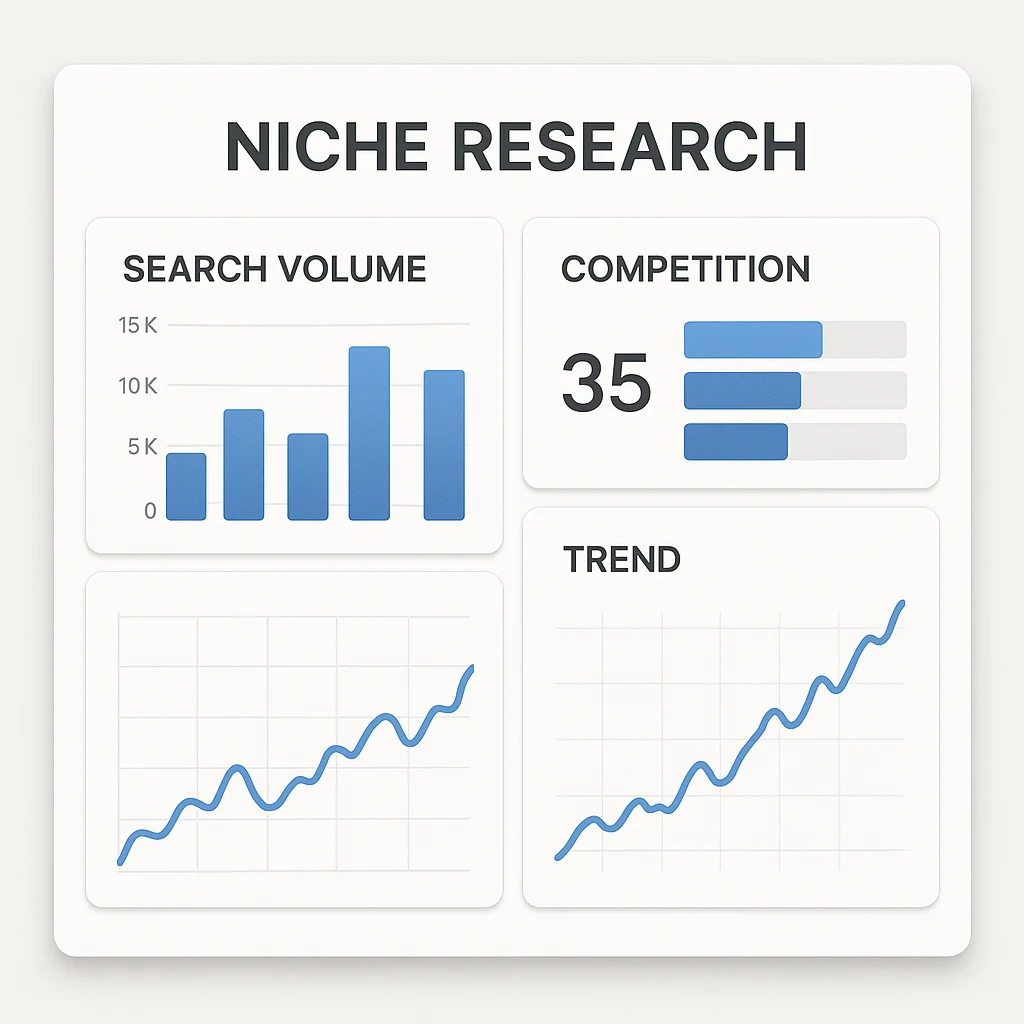
Without these core metrics, you’re essentially guessing which niches might be profitable.
Free vs. Paid Options
I’ve been on both sides of this equation. When starting out, I relied exclusively on free niche research techniques. They’re great for beginners, but they come with limitations.
Free tools often:
- Restrict the number of daily searches
- Provide less comprehensive data
- Offer limited historical information
Paid tools generally deliver more accurate insights and save significant time. However, they’re an investment that needs to justify itself with results.
Balancing Data Accuracy and Usability
The perfect niche research software balances comprehensive data with an intuitive interface. Some of the most powerful tools I’ve tried were so complicated that using them felt like learning a new language.
When choosing your tools, consider how quickly you can extract actionable insights. The best niche research tools present complex data in visual, easy-to-understand formats that help you make decisions faster.
Top Niche Research Tools for Keyword Analysis
Keyword research forms the foundation of any successful niche selection process. These tools help you understand what your potential audience is searching for and how difficult it will be to rank for those terms.
SEMrush – The All-in-One Niche Research Solution
When I need comprehensive niche market analysis, SEMrush is usually my first stop. Its Keyword Magic Tool has helped me discover untapped niche markets multiple times.
What makes SEMrush stand out:
- The Topic Research feature identifies trending subjects
- Keyword difficulty scores help assess competition
- The Market Explorer tool reveals niche audience demographics
- Competitive analysis shows what’s working for others in your potential niche
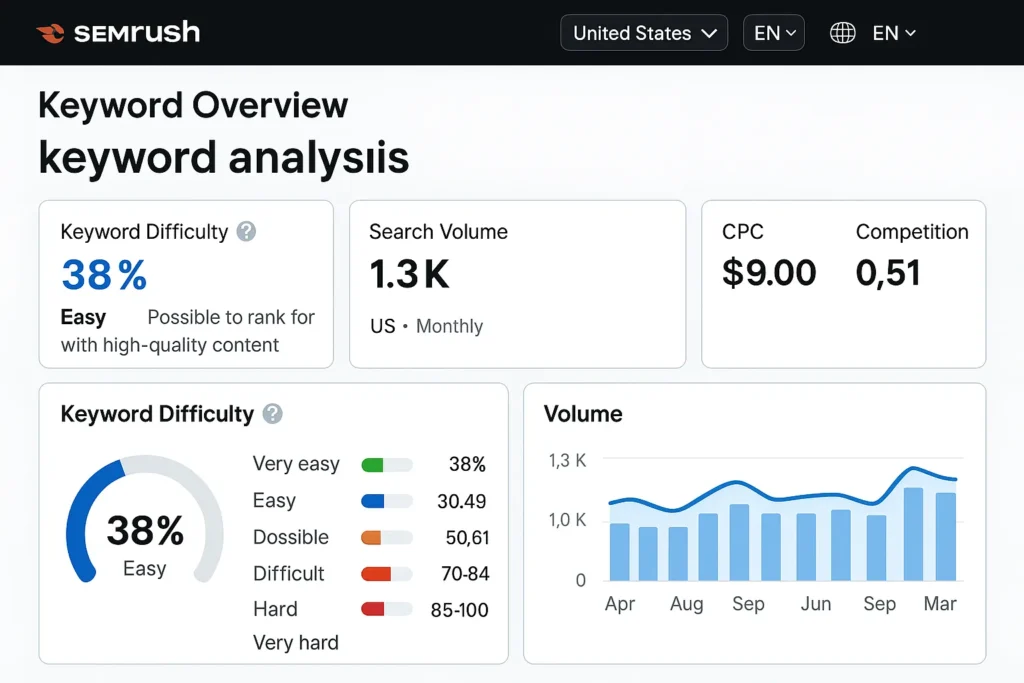
While SEMrush requires a subscription (starting around $119/month), I’ve found it pays for itself if you’re serious about finding profitable blog niches. During my launch of a home organization blog, SEMrush helped me identify a sub-niche with high search volume but surprisingly low competition.
Ahrefs – Deep Competitive Analysis
Ahrefs excels at revealing what’s already working in your target niche. Its Content Explorer has saved me countless hours by showing exactly which topics perform best.
Ahrefs offers:
- Content Gap analysis to find keyword opportunities
- Site Explorer to evaluate competitor strategies
- Keywords Explorer with parent topic grouping
- Clear difficulty metrics for niche validation
I particularly value Ahrefs’ “Traffic Potential” metric, which gives a more realistic view of a keyword’s value beyond just search volume. This helped me pivot away from a seemingly promising fitness sub-niche that actually had limited traffic potential despite high search volumes.
Google Keyword Planner – The Free Essential
Don’t underestimate this free tool from Google. While primarily designed for advertisers, Google Keyword Planner provides valuable niche keyword difficulty insights without spending a dime.
What I appreciate about Google Keyword Planner:
- Accurate search volume data (though in ranges for non-advertisers)
- Commercial intent signals through bid estimates
- Seasonal trend data for niche topics
- Endless keyword ideas through its suggestion feature
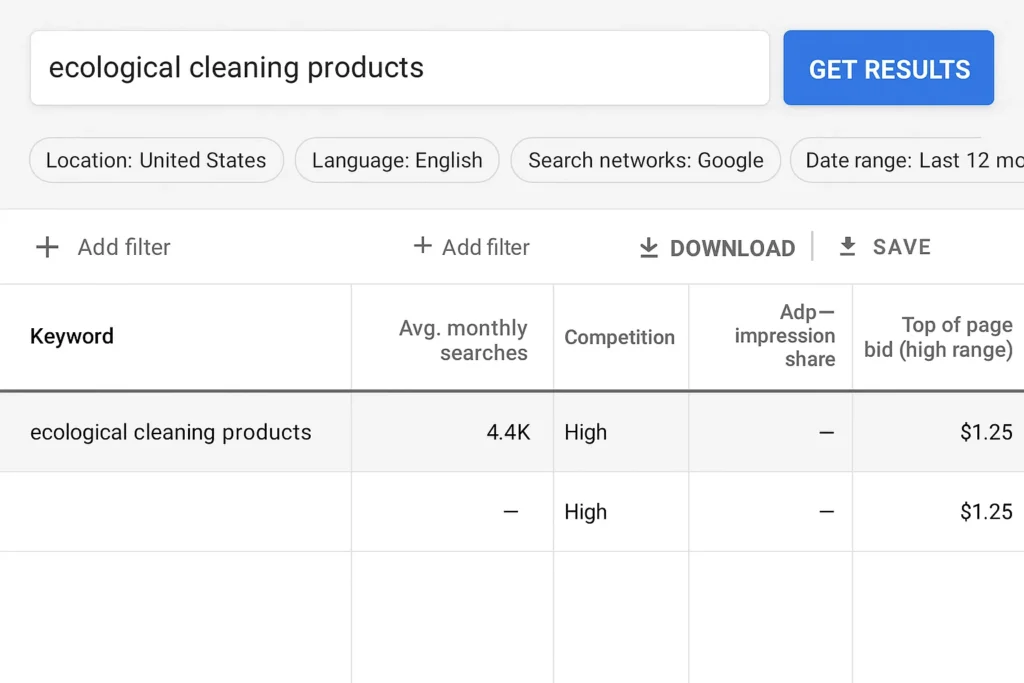
Though not as comprehensive as paid options, I still use Keyword Planner in my initial niche research process to validate ideas before diving deeper with other tools.
Best Tools for Audience Research and Validation
Keywords alone don’t tell the full story. Understanding your potential audience’s behaviors, questions, and preferences is crucial for niche selection.
BuzzSumo – Content and Audience Insights
BuzzSumo has helped me identify what content actually resonates with audiences in different niches. This blog audience research tool shows the most-shared content across social platforms, revealing what people find valuable enough to share.
BuzzSumo’s strengths include:
- Content performance analysis by social shares
- Identification of influencers in each niche
- Question analyzer showing what people ask about topics
- Content type analysis (what formats perform best)
When researching a potential cooking niche, BuzzSumo showed me that recipe videos significantly outperformed text recipes in social engagement—crucial information that influenced my content strategy.
Answer The Public – Understanding Audience Questions
This visual keyword research tool displays questions people ask about any topic in an intuitive “question wheel” format. I use Answer The Public to understand audience pain points and information needs.
What makes it valuable for niche research:
- Visual representation of question-based queries
- Organization by question types (what, why, how, etc.)
- Comparison queries people make within a niche
- Preposition queries revealing contextual searches
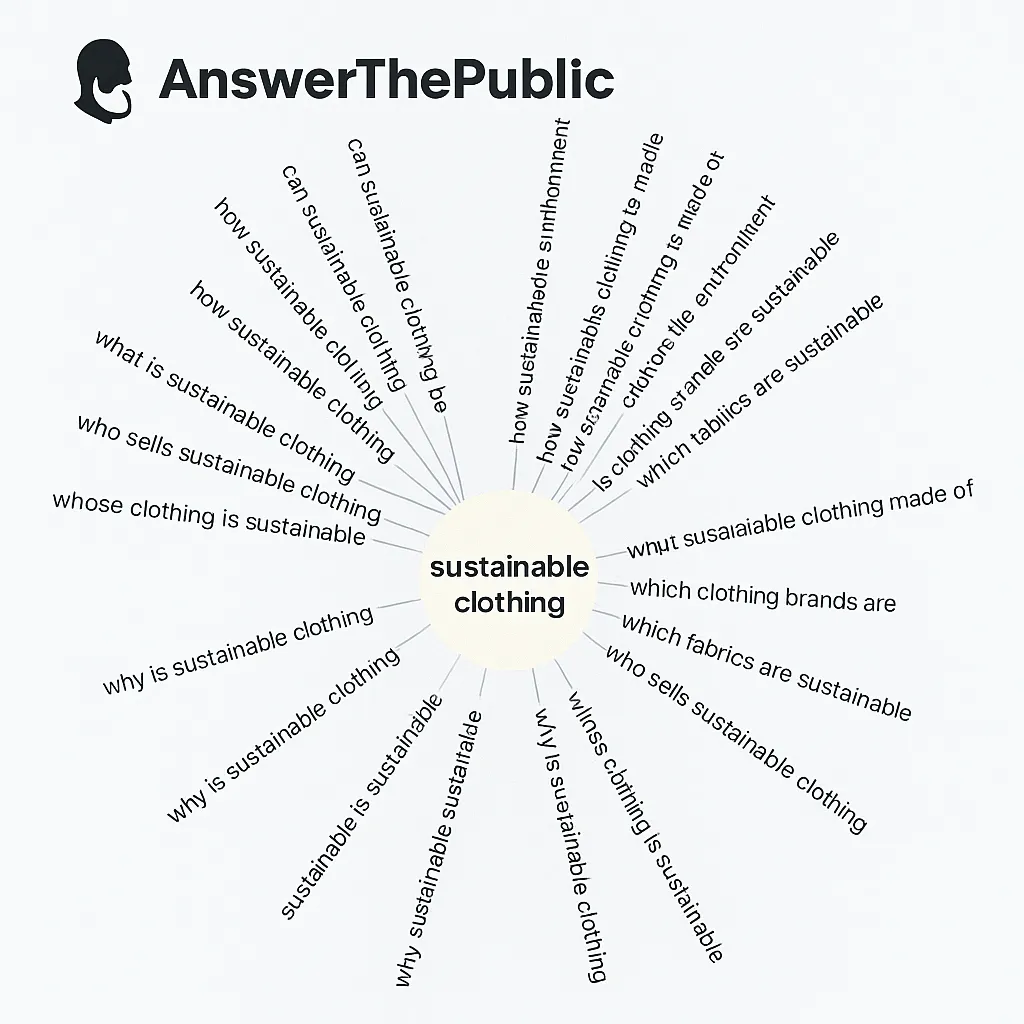
This tool has helped me discover sub-niches I never would have considered. For example, when researching a pet care blog, I found an untapped opportunity around anxiety products for pets—something I wouldn’t have discovered through traditional keyword research.
SparkToro – Discovering Where Your Audience Hangs Out
SparkToro answers a critical question: “Where does my potential audience spend their time online?” This helps validate niche relevance score and potential reach.
SparkToro reveals:
- Websites your audience frequently visits
- Social accounts they follow
- Podcasts they listen to
- YouTube channels they watch
- Hashtags they use
This intelligence is invaluable for both niche selection and future marketing efforts. When I was considering a personal finance blog focused on millennials, SparkToro showed me exactly which platforms and influencers were already capturing this audience’s attention.
Specialized Niche Research Tools for Profitability
Finding a niche with search volume is one thing—finding one that can sustain a profitable blog is another. These tools help assess monetization potential.
Exploding Topics – Finding Trending Niche Finder
Exploding Topics identifies topics before they become mainstream, giving you first-mover advantage in emerging niches. I’ve used it to spot trends months before they peaked.
What makes Exploding Topics special:
- Early trend identification
- Historical trend graphs
- Categorized topic exploration
- Pro version includes market analysis

This tool helped me launch a sustainable living blog section focused on “zero waste bathroom products” just as the topic was beginning its upward trajectory—perfect timing that would have been impossible to guess without data.
Ubersuggest – Affordable Niche Analysis
Neil Patel’s Ubersuggest offers an impressive range of niche research metrics at a more accessible price point than many competitors. It’s my go-to recommendation for bloggers on a budget.
Ubersuggest provides:
- Keyword overview with volume and difficulty
- Content idea suggestions
- Top-performing pages in each niche
- Backlink data for competitive analysis
When launching my productivity blog, Ubersuggest helped me identify several long-tail keyword opportunities with decent search volume but surprisingly low competition.
Mangools – User-Friendly Niche Validation
The Mangools suite (especially KWFinder) stands out for its intuitive interface and straightforward niche saturation checker capabilities. When I need quick validation of a niche idea, I often turn here first.
Mangools’ advantages include:
- Extremely user-friendly interface
- Clear color-coded difficulty scores
- Local search volume data
- SERP analysis showing who you’d compete against
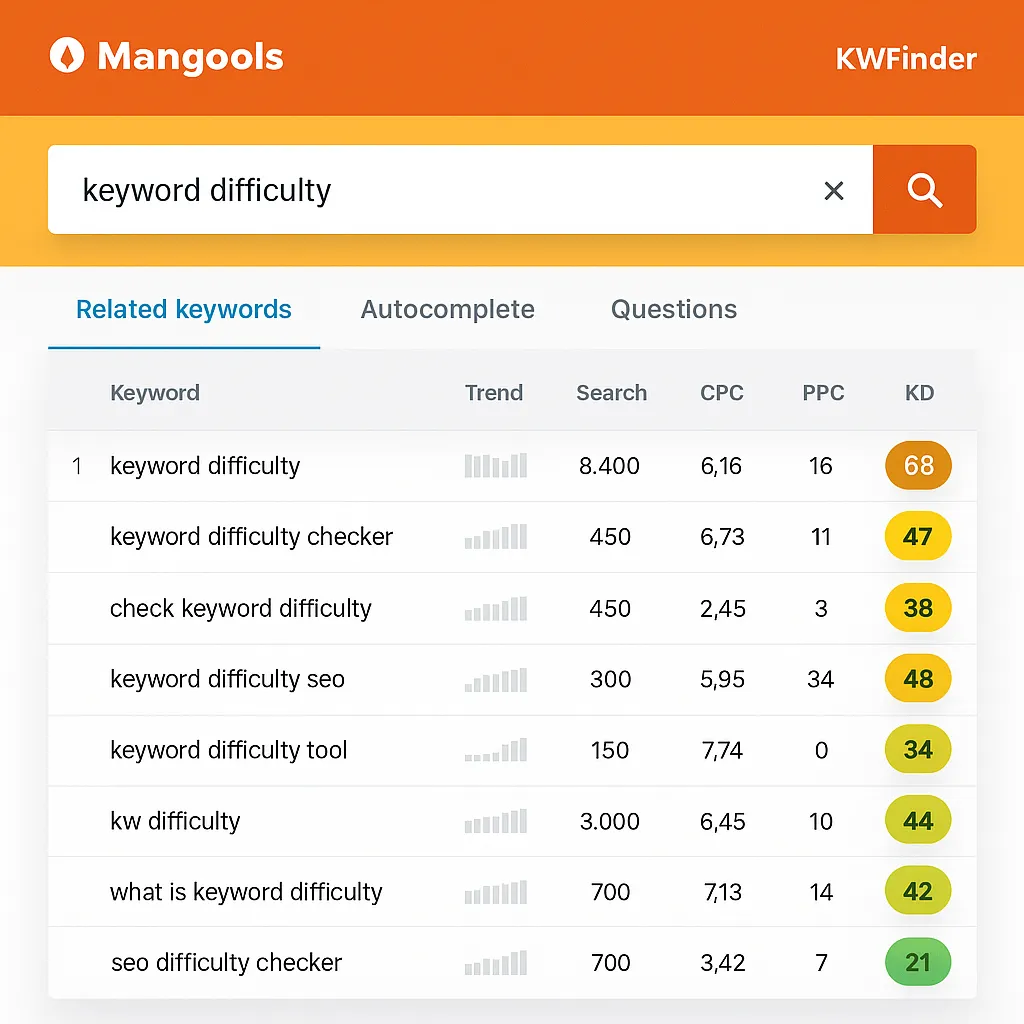
This tool suite saved me from pursuing a travel photography blog niche that seemed promising until Mangools revealed just how dominated it was by established sites with massive domain authority.
How I Use Niche Research Tools in My Process
After years of refining my approach, I’ve developed a systematic process that combines multiple niche research techniques to find opportunities others miss.
My Step-by-Step Niche Research Framework
- Broad idea generation: I start with brainstorming interests and potential niches, then use Google Trends to assess general demand trajectory.
- Keyword expansion: Next, I take those ideas to SEMrush or Ahrefs to expand into hundreds of related keywords and topic clusters.
- Competition analysis: For promising niches, I analyze the top 10 Google results to assess domain authority, content quality, and backlink profiles.
- Audience validation: Using BuzzSumo and SparkToro, I confirm there’s an engaged audience actively consuming content in this space.
- Profitability check: Finally, I research monetization avenues including affiliate programs, relevant products, and ad potential.
This methodical approach has helped me avoid numerous niche research mistakes that would have led to wasted months of effort.
Combining Multiple Tools for Better Results
No single tool provides the complete picture. I’ve found that combining data from multiple sources creates a more reliable foundation for decisions.
For example, when researching my home organization blog:
- SEMrush provided keyword volumes and difficulty
- BuzzSumo showed which content formats performed best
- SparkToro revealed where my audience spent time
- Exploding Topics identified emerging sub-niches
Common Mistakes to Avoid in Niche Research
Throughout my blogging journey, I’ve watched countless aspiring bloggers make the same niche research mistakes. Let me help you avoid them.
Ignoring Competition Analysis
Many bloggers get excited about high search volumes without considering who they’ll be competing against. I learned this lesson the hard way with my first blog.
Before committing to any niche, thoroughly analyze:
- Domain authority of top competitors
- Content quality and depth
- Backlink profiles
- Publishing frequency
If the top 10 results are dominated by major publications and sites with domain authorities above 70, you’re facing an uphill battle regardless of how good your content might be.
Overlooking Monetization Potential
A niche can have plenty of traffic but still be difficult to monetize. Before investing months of effort, research:
- Relevant affiliate programs and commission rates
- Ad revenue potential (some niches have higher CPMs)
- Product creation opportunities
- Sponsored content demand
I once abandoned a promising personal development sub-niche after discovering the audience was resistant to purchasing products or clicking affiliate links—a critical insight that saved me months of effort.
Missing Audience Validation
Search volume doesn’t always translate to an engaged audience willing to follow your blog. Look for evidence of community engagement:
- Active social media groups
- Comment sections on existing blogs
- Forum discussions
- Related podcasts and YouTube channels

The most profitable blog niches typically have audiences who are actively seeking solutions to problems—not just casually interested in a topic.
Budget-Friendly Niche Research Strategies
Not everyone can afford premium tools when starting out. I’ve been there, and these strategies helped me conduct effective research on a tight budget.
Maximizing Free Tool Features
You can gather substantial niche insights using free tools:
- Google Keyword Planner for basic volume data
- Answer The Public for question research (limited searches on free plan)
- Google Trends for historical interest patterns
- Reddit and Quora for audience pain points
- Free trials of premium tools (schedule efficiently!)
When I started my first successful blog, I relied exclusively on free niche research software. While it required more manual work, the insights were sufficient to make an informed decision.
Smart Investments for Serious Bloggers
Once you’re ready to invest, prioritize tools that deliver the most value:
- Start with a month of either SEMrush or Ahrefs (not both)
- Use that month to extract as much data as possible
- Consider affordable alternatives like Mangools or Ubersuggest for ongoing research
- Pool resources with other bloggers to share premium tool costs
I now budget approximately $200 monthly for research tools, but this investment generates substantial returns through better targeting and opportunity identification.
Conclusion
Selecting the right niche research tools can mean the difference between a blog that thrives and one that struggles to find an audience. Through years of trial and error, I’ve found that combining keyword research, audience validation, competition analysis, and profitability assessment creates the most reliable foundation for niche selection.
Whether you’re working with free resources or premium tools, the systematic approach outlined in this guide will help you identify niches with the perfect balance of opportunity and accessibility. Remember that the best niche research tools aren’t necessarily the most expensive ones—they’re the ones that provide actionable insights for your specific goals.
I’d love to hear which tools you’ve found most valuable in your niche research process. Have you discovered any hidden gems I missed? Drop a comment below to share your experiences!

